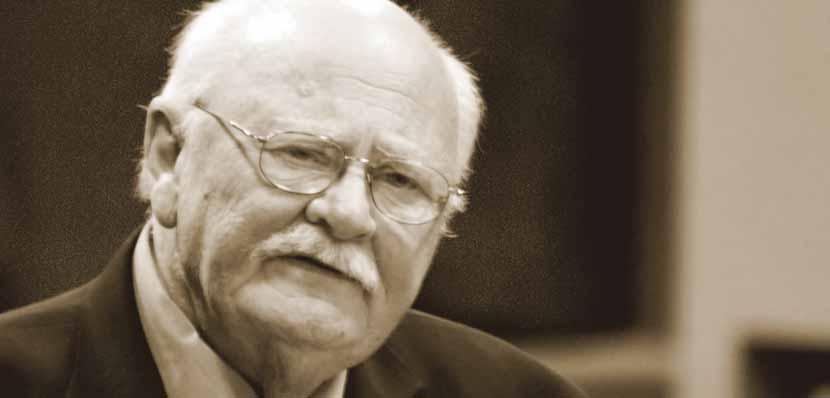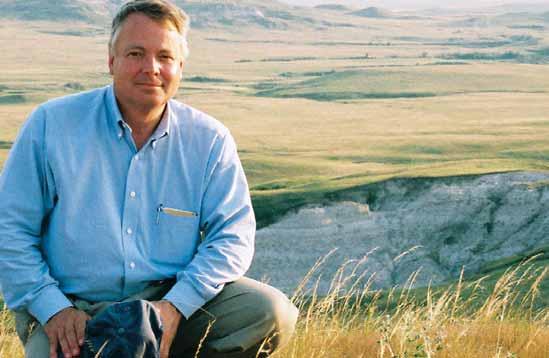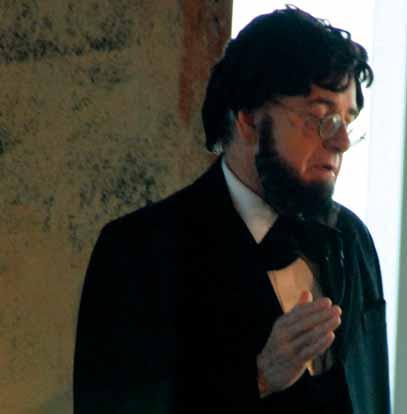
13 minute read
Defining Lincoln’s Religion
By John Helgeland
Abraham Lincoln did not join a church. For many, whose only model of religion is built around a church or synagogue, the case is closed: Lincoln could not have been religious. Yet many who study religion in its various forms regard Lincoln as articulating original and creative religious sentiments that mark him as the most profound religious thinker in the nineteenth century. That such an understanding of religion should come from one reared in the back woods of Kentucky and Indiana with less than two years of formal education indicates that we are confronted by genius.
Advertisement
Where did his sophistication originate, then, if not in church? We are told that he was a voracious reader and that he read from the best authors of the Western culture’s canon with the Bible and Shakespeare most regularly consulted. He read so consistently that his neighbors regarded him as lazy and a shirker. In addition to these literary texts, he read law and eventually became prepared to earn his living as a lawyer, one who was highly regarded in the profession.
LINCOLN’S RELIGIOUS ENVIRONMENT The year Lincoln was born, 1809, was close to the time that the Second Great Awakening began to make its impact on the frontier; at least we could say that this religion and his early years ran together. The nature of this religious style must have offended Lincoln’s sensitivities. Largely instrumental, this awakening aimed at producing mass conversions in a procedural sort of way. It first began its approach by causing a deep-seated sense of guilt and sinfulness, moving from there to show that surrender to Jesus was the only way out for the sinner otherwise destined to roast in the flames of hell.
From the colonial period onward, America has been subject to this type of apocalyptic preaching. This preaching has created a structure of thought that shapes people’s understanding of the direction in which history is moving. History is the stage on which there are two forces vying for ascendancy – good and evil. One or the other will triumph, usually as a consequence of a Holy War or a Crusade. God will support only one side and bestow it with victory. From the perspective of the righteous and holy side, the duty is clear – those that have taken the evil course are beyond saving and must be destroyed. Failure to destroy evil is itself a moral fault which God will punish.
Where could such extreme and simplistic views of good and evil originate? The Puritan preachers, it has been discovered, took the majority of texts for their sermons from the book of Revelation in the New Testament. From here they developed the worldview that we have just seen above. Once this dualistic perspective takes root, it becomes a structure of thought. For example, this structure demands an enemy; if such an enemy is not readily at hand then one must be invented. Once invented, it then must be struck down without mercy.
It is only a short time before the beginning of the Civil War that we have a salient example of just that kind of thinking. John Brown saw himself as a righteous crusader because, with a Bible in one hand and a pistol in the other, he set about to destroy the pro-slavery settlers on Pottawatomie Creek in Kansas who, unarmed, became victims of Brown’s holy militia. Brown bragged about his raid later in Boston in the company of famous abolitionists. In 1859, Brown put together a raiding party of sixteen men to attack the Harper’s Ferry arsenal to capture arms and munitions to distribute to black slaves and white abolitionists. He hoped that a war could be started to put an end to slavery once and for all. Taken out to be hung in December 1859, Brown proclaimed himself a martyr, another salient theme of the apocalyptic mind-set.
Lincoln was not attracted to revivalist religion or to apocalyptic themes. What religious interest we can detect in him in his early manhood was a fascination for Deist or Enlightenment religious thought. He went down this path so far as to experiment with agnostic ideas. Later in life when he ran for public office, his friends sought to repress those writings since they were aware of how damaging an agnostic reputation could be to an incipient political career. Indeed, in the time of the Second Great Awakening it was popular to ridicule, if not condemn outright, the Deists, many of whom were involved with our country’s founding documents.
Perhaps this time of skeptical freethought formed one aspect of Lincoln’s religion later in life. From this time forward Lincoln had no faith in creeds or any elaborate theological constructions. He witnessed churches competing for membership by attacking each other’s doctrines. Watching this warfare proceed gave Lincoln the idea that when two churches with radically different teachings claim to represent the true teachings of God it becomes clear that while one church may be right, certainly both may not be right, and it is beyond us to tell the difference. Such thoughts returned to Lincoln during the Civil War.
Even though not a church member, Lincoln had collegial relationships with some clergy. The one who perhaps had the most influence was Dr. James Smith. He was a great comfort when the Lincolns lost their first son. In addition, however, Smith wrote a book entitled The Christian’s Defense, an answer to the attacks on religion put forth by the freethinkers. Lincoln found Smith’s arguments (which he said that he read through a lawyer’s eyes) to have answered his questions about the authenticity of scripture. Apparently, the book had quite an impact judging from the number of times Lincoln mentioned it to various friends and colleagues. It helped him to think about central religious themes such as sacrifice – a theme which appeared time and again as he sought to understand and explain the meaning of the war. Knowing Lincoln’s aversion to technical and dogmatic theology, it is
interesting to see how he delved into this volume, all 600 pages of it. Why? First, he trusted the author. Second, Smith used the rules of evidence carefully, much as an attorney might do. And third, these arguments for scripture were “ethically clean” and did not set up the opponent to be a straw man. Finally, Lincoln was encouraged to find that faith and reason were not contradictory and to discover that God acts in history. “We cannot escape history,” he said, meaning we cannot escape God.
ELEMENTS OF LINCOLN’S PERSONAL RELIGION From early manhood until his death, Lincoln suffered from depression. So intense was it that at several times he contemplated taking his own life. When Ann Rutledge, an early sweetheart, died, his grief increased his depression to the extent that his friends formed a suicide watch. Joshua Speed, Lincoln’s friend, told him he “must rally or die.” Two decades later, Lincoln remembered those times and remarked to Speed, visiting him in the Whitehouse, that he rallied because he had something meaningful to accomplish, that is, to be the author of the Emancipation Proclamation. Clearly, Lincoln sensed that there was some meaningful purpose for which he had been created.
Lincoln also interpreted his sufferings as leading to something “purer and holier,” that his melancholy was refining his character. As time wore on, Lincoln’s true friend came to be the Bible about which he became more knowledgeable than most of his contemporaries. Certain parts of it attracted him more than others, and Job in particular resonated with Lincoln’s suffering; he and Job suffered for no fault of their own.
Acquainted with grief, Lincoln had to struggle to keep that condition from destroying him. It was not only the passing of Ann Rutledge but also the deaths of two sons, one in Springfield, the other in the White House, that profoundly weighed on him. The latter was especially hard because his wife was completely undone by it. Only those who suffer seem to realize the depth of sadness others bear at such a time. Life has plenty of grief without adding a war to it. In the many cases of soldiers whom Lincoln knew personally, he was never tardy in sharing a word of compassion with the survivors, usually widows. Because of the profound experiences with his own losses, he seemed to be as pastoral as he was presidential in reaching out to survivors – and there were many of them. He assured one widow that better days will come, but not soon; life can eventually return to joy.
RELIGION IN THE WHITE HOUSE Lincoln could not abide the thought that some men profit by the means of other’s toil; slavery, therefore, was a blatant contradiction to the founding documents of the United States. Although he would not write the Emancipation Proclamation immediately after taking the oath of office (he waited for a decisive battle, in the North’s favor before enacting it). In his own estimation it was his highest achievement. There are two sources for Lincoln’s ethical stance toward ending slavery.
First, from the Book of Genesis (3:19): “In the sweat of your face shall you eat bread.” It was a grave offense to Lincoln and others from the abolitionist side also that one man should produce bread from the sweat of his brow and another should eat it. For Lincoln this was the iconic thought that symbolized the entire system of slavery. And, secondly, the Declaration of Independence states that “All men are created equal.” Not only are the slaves equal, but even more basic is the observation that they, too, are men.
Even before Lincoln took office, the nation began to be split by war, and by April of 1861, the attack on Ft. Sumter plunged America into a war that took four years to conclude. Lincoln had to wait two long years for the war to turn to the North’s favor. This was the significance of the Battle of Gettysburg, for it was the high water mark of the Confederacy and was a decisive defeat for them deep in Northern territory. The total casualty list for the three days in July 1863 was over 50,000. The farmland around Gettysburg was set aside for a national cemetery; it was not until November that the chosen orator, Edward Everett from Harvard, was prepared to deliver his oration; it took slightly over two hours and, at the time, was considered an elegant statement. As it has been said, a great tree is most easily measured once it has fallen, and so the true magnificence of the Gettysburg Address is now regarded after Lincoln’s death as one of the fi nest creations in the English language, an estimation which Everett himself made, confessing that Lincoln’s three minutes captured the meaning of the battle more concisely than his two hours on the dais.
It is likely that the address had been the product of many months of reflection; what was the war about? What was it about really, down deep? For the answer, Lincoln moved far from the commonplace answers about this battle or concerns with whomever might be commanding. This was God’s war, but not in the apocalyptic sense where one side is saintly and the other evil. As he looked from the podium across the battleground where, perhaps, half of the casualties awaited burial, Lincoln shared his carefully considered interpretation of what had happened there and would not stop for almost another two years. Had he promoted the apocalyptic viewpoint, then half of the
casualties, the Northern ones, would be martyrs and the rest would be demons, justifiably slain. Rather, reflecting his reading of scripture in verses not expressing the apocalyptic mythology, Lincoln interpreted the destruction of these soldiers as a sacrifice where they gave “their last measure of devotion.” “They” meaning both Johnny Reb and Billy Yank. “From these honored dead” we are witnesses to a nation in the process of being reborn with the theme of freedom for all. Death, conception, and rebirth circumscribe the meaning of this war. There are those who would say that war is so horrible that it has no meaning, indeed that it blots out and destroys all meaning. But at Gettysburg, Lincoln, who had no church membership, became pastor to the nation – Union and Rebellion. He was looking forward to a future that he would briefly glimpse before the assassin’s bullet found him. It was a future that would be a light to the world: “that government of the people, by the people, for the people, shall not perish from the earth.” These “honored dead” perished that such a government could become real.
Another short speech was Lincoln’s second inaugural address. This document, too, was a critique of the apocalyptic thought that had seized the minds and spirits of many of his countrymen. Of course, they thought, the Confederate general staff, especially Robert E. Lee and Jefferson Davis, the president of the South, ought to be hung as traitors after the war was finished. In this address, Lincoln makes more explicit why these “honored dead” were sacrificed. Though Lincoln refused to explain the mind of God, he does say that, if the war continues, it is the will of God. God is punishing the whole nation for slavery so that every drop of blood drawn by the slaveowner’s lash will have to be repaid on the battlefield. Lincoln had a sense for the doctrine of corporate evil where no one is innocent. It is a fact that Northern textile mills profited greatly from the cotton from the South raised by slaves. All are guilty and all suffer from the dreadful war.
Such thoughts robbed many of the justification for punishing the South. Lincoln’s great concern in the closing months of the war was to bind up wounds and achieve normality as soon as possible. Revenge, however, is an attitude most at home in the apocalyptic imagination. In the Second Inaugural Address it is clear that Lincoln rose above that attitude; maybe he even had to fi ght it in his own
soul, thinking of the many friends who died on the battlefield. “Malice toward none and charity for all,” was Lincoln’s response even to great men such as Henry Ward Beecher who dreamed of endless retribution.
Lincoln’s spirit of reconciliation was already becoming real. When General Lee surrendered to General Grant, humiliation and revenge were not part of the picture. Lee kept his sword, his men kept their mounts for spring plowing, and the blue boys shared their provisions with the famished gray boys. It may be that this magnanimity prevented a guerilla war from lasting years, as some in the South vowed that it should. Who can say that if Lincoln would have been granted old age that the revenge that sprouted after his death, leading to harsh treatment of the South, might have been otherwise? Even today the hatred of Yankees remains operative in places in the South.
In the final analysis, we can, as we have, chart some of the influences on Lincoln’s religion and locate him in the context of the time. Nevertheless, he remains a mystery, a ball of contradictions, and as strange to himself as to those near him. He was certainly not divine, but divinity from time to time shown through him. Maybe it is enough to say that Lincoln epitomized the very best of our culture. He was with us for a while and we matured on that account. Comes the assassination and he is no more. Was he a martyr? No. Perhaps he would say rather that he was part of the sacrifice that God asked of the whole nation in those days.
John Helgeland is a professor of history at NDSU. He received his PhD from the University of Chicago. He currently serves on the NDSU Bush Ethics Committee. John also has received the Blue Key Distinguished Educator Award.









